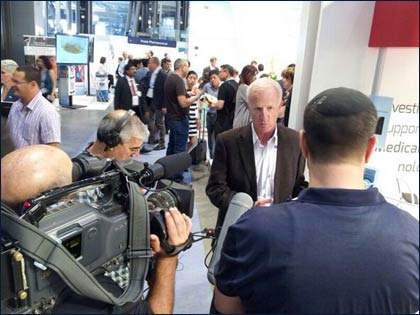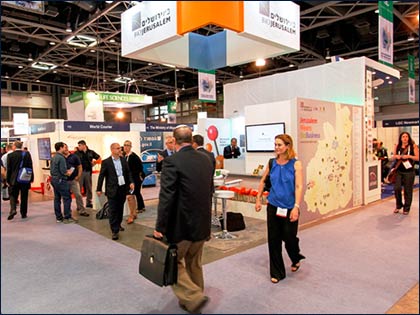By Avigayil Kadesh
Falafel, high-tech and biomed may be the three best things to come out of Israel. Falafel can be found on every street corner. However, if you are an investor, entrepreneur, tech buyer, or are looking to grab some business from Israel’s powerful medical community, the first place to go is the annual BioMed event, held every summer in Tel Aviv.
Some major deals were announced at the recent MIXiii BioMed, otherwise known as the
Israel Innovation Conference, at the Israel Trade Fairs and Convention Center in Tel Aviv. Close to 2,000 participants from dozens of countries in Europe, North America and Asia came to present their products, meet with investors and patent agents, and glimpse the ecosystem that makes Israel one of the largest global innovation hubs.
Israel has about 920 life-sciences companies, with two-thirds of them built in the last decade.
American pharmaceutical giant Merck signed a cooperation agreement with the Chief Scientist of Israel aimed at helping Merck identify Israeli companies that are ripe for collaboration on joint technology projects.
“As a society that invests in developing life-saving medicines that impact the lives of millions of people around the world, we see Israel as a hotbed for innovation in medicine,” said Sharon Alon, CEO of MSD, as Merck is known outside the United States. “We are proud to be able to contribute to the development of medical innovations in Israel.”
Microsoft Israel announced a new accelerator program with BD Technologies focusing on health tech; Samsung Electronics announced new investments in digital health innovations in Israel; and Alcatel-Lucent unveiled plans to open a Bell Labs facility in Tel Aviv.
In his keynote speech, Alcatel-Lucent CEO Michel Combes said the new facility “will provide a critical ‘listening post’ to Bell Labs and Alcatel-Lucent’s innovation in the cloud space, drawing on the local technology community’s rich history in technological disruption.”
Vikas Jain, CEO of Indian smartphone maker Micromax, was there to scout out app developers as trade between Israel and India has grown to $6 billion annually. “We want to integrate the best apps and mobile software platforms into our ecosystem and create a hardware and software experience that will be second to none, and we see Israeli apps and mobile tech as a key to this,” said Jain.

Shai Levanon, CEO of IonMed, speaking to reporters at MIXiii Photo courtesy of Trendlines Group The international conference was the first in the world to encompass both the biomed and high-tech members of the Israel Advanced Technology Industries (IATI), Israel's umbrella organization representing high-tech, biomed and multinational corporations, startups, incubators, accelerators, academic technology transfer offices, venture capital funds, service providers and more.
Biomed startups to watch
Many Israeli companies introduced new products, touted existing products and wooed investors for products in development.
An innovation award competition under the auspices of the Office of the Chief Scientist drew 60 Israeli startup contestants. A panel of judges chose 20 companies to present on stage for seven minutes each. The three winners were wave energy company
Eco Wave Power, big-data storage company
SQream and voice-recognition pioneer
VocalZoom.
Trendlines Medical was promoting its portfolio companies, including 16 in the business development stage.
Among these 16 were 2P2D’s SlimPack drug packaging using 50 percent less carton volume; Nephera treatment for enhancing kidney function in patients with congestive heart failure; Gordian Surgical’s unique surgical closures; IonMed’s cold-plasma wound sealing system, MediValve’s positioning device for cardiac surgery; the NeuroQuest biomarker for diagnosing Alzheimer’s; and ProArc Medical’s minimally invasive outpatient treatment for enlarged prostate.
Cutting-edge science
Trendlines Medical’s vice president for business development, Omer Schalit-Cohen, says
Trendlines Labs was founded about two years ago to create medical innovations to fill unmet needs identified by hospitals, physicians or the six-person team itself.
“We will then develop companies together and work on how to commercialize the products,” he says. “We saw a big need in the market, because large companies are reducing their R&D and they need someone they can work with that can develop products for their needs.”

BioJerusalem’s booth at MIXiii BioJerusalem, a government-supported portal to Jerusalem's growing life-science cluster, hosted 200 participants -- from Israel as well as the US, UK, China, France, Sweden, Denmark and Singapore – at a cocktail party featuring a panel of executives representing
BioLineRx,
BioMAS pharmaceuticals, NovellusDx (for diagnosis and treatment of lung cancer) and
Brainsway (maker of a non-invasive device to treat brain disorders).
Dr. Shai Melcer, general manager of BioJerusalem for the Jerusalem Development Authority, says the international conference “offered an excellent opportunity to present the cutting-edge science, technology and innovation originating from Jerusalem-based companies. We were most fortunate to introduce what Jerusalem has to offer biomed companies in terms of state-of-the-art R&D infrastructure, human capital and financial incentives at our booth located between Yissum, the technology transfer company of the Hebrew University, and Teva, the world’s largest generic pharmaceutical company, that has been in Jerusalem since 1901.”